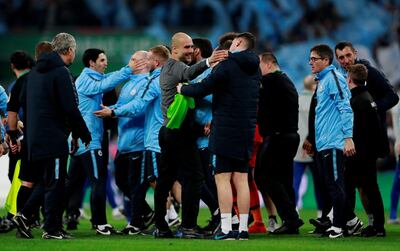It felt an anti-climactic exit. The Etihad Stadium was nearing emptiness when Manuel Pellegrini trudged around the pitch in May 2016. The lap of honour after his final home game was dubbed a case of "lapathy".
A more fitting farewell came the following week, after Manchester City had booked fourth spot with a draw at Swansea City and, egged on by Yaya Toure, Pellegrini had thrown his jacket into the crowd, although only after taking care to remove his wallet first. “This Charming Man", as the banner in the City crowd used to deem him, could be a careful one.
He was in his rhetoric, if rarely in his tactics. Pellegrini felt City’s unexciting enigma, cultivating a grey persona but producing scintillating football.
As he makes his first return to the Etihad Stadium, it is with Pep Guardiola’s side on 127 goals in all competitions, including four against the Chilean’s West Ham United in November. They are chasing the English record of 156 in a season.
“The team that scored the most goals in history,” Pellegrini noted; it was his City in 2013/14.
He was perhaps the bland cavalier, a man whose Premier League title is sometimes remembered for being one Liverpool supposedly lost, rather than he won. That feels rather unfair.
The Chilean won three trophies in as many seasons in Manchester and has taken two clubs who had never previously reached Uefa Champions League semi-finals to Europe’s last four, but he has never been a skilled self-publicist.
He has tried to redress the balance this week. “When I think back to my time at Manchester City, I remember three beautiful years,” he said.
But unflattering perceptions have persisted. One is that he was a glorified caretaker while City waited for Guardiola as he managed Bayern Munich, a bridge between the bigger, more dominant personalities of Roberto Mancini and the Catalan.
Another is that he neglected the caretaker’s essential duties by failing to prepare for the future. Accusations of drift and decline were levelled in his valedictory campaign.
It perhaps meant that, whereas Pellegrini’s debut season was a glorious success, Guardiola’s was a transitional year. He inherited four full-backs in their thirties. Only West Bromwich Albion and Watford named older sides than City in Pellegrini’s final year; at times, Kevin de Bruyne was City’s youngest player.
A team has been transformed since his departure.
Only five of what is arguably City’s strongest 11 played under Pellegrini; only three of them were technically his signings and an interest in Fernandinho began during Mancini’s reign, while it is no great leap of faith to say that Guardiola was aware of City’s moves for De Bruyne and Raheem Sterling.

Pellegrini mounted the case for the defence. If there was a sense he preferred senior professionals, he argued a punishment for breaching Financial Fair Play denied him the chance to rebuild.
“The second year was a little more difficult, finishing second and [we] couldn't win a title, as we were punished from Uefa rules so we couldn't strengthen our squad,” he said.
The sense was that his employers understood. Pellegrini departed three years ago with a Lowry painting, a present from Sheikh Mansour bin Zayed, Deputy Prime Minister and Minister of Presidential Affairs, and a glowing tribute from chairman Khaldoon Al Mubarak, who cited his “integrity and humility”.
On Tuesday, Guardiola added his praise.
“He did an incredible job,” he said. “The league he won was outstanding with the way they played and the amount of goals. Manuel is an excellent person – always polite and respects clubs.”
There may be a belated appreciation of a slightly overlooked era when the City supporters are briefly reunited with Pellegrini. A reception awaits, and Guardiola added: “I’m pretty sure it will be high.”


